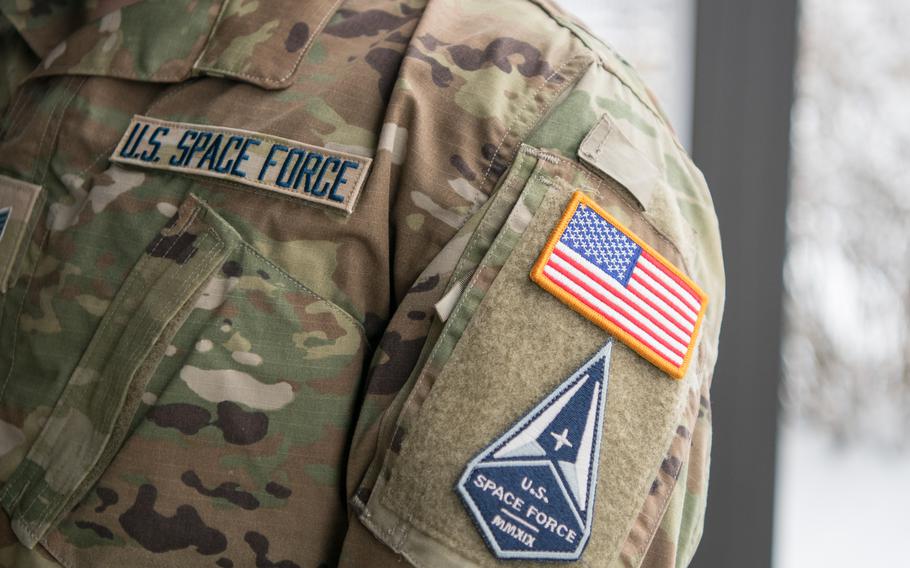
Two space experts said Thursday, Sept. 28, 2023, that a government shutdown and the disruption to military funding likely could be most devastating to Space Force of all the service branches. (Mauricio Campino/U.S. Air Force)
WASHINGTON – Two space experts said Thursday that a government shutdown and the disruption to military funding likely could be most devastating to Space Force of all the service branches.
The government will shut down Saturday night if Congress doesn’t pass legislation to continue funding federal operations. That includes the possibility of hundreds of thousands of American troops working without their normal paychecks. By late Thursday afternoon, Congress still seemed far from a resolution.
“We have families across our military force … the shutdown is going to impact all of these families,” Pentagon spokeswoman Sabrina Singh said Thursday.
Legislation has been introduced in Congress that would continue to pay active-duty troops on time, but it has not been passed and might not be before the last day of the fiscal year on Saturday. The shutdown threat is coming from a small group of House Republicans who are holding up funding over hardline issues such as funding a U.S.-Mexico border wall, opposition to Ukraine aid, and federal investigations of former President Donald Trump. House Republicans have twice failed in recent weeks to put their defense appropriations bill on the floor for a vote due to party infighting.
All military branches would be affected by a government shutdown, but some experts believe the service with the most to lose is Space Force.
“Bottom line … a government shutdown would portend serious consequences for the Space Force as guardians strive to build a new architecture of capabilities required to meet burgeoning mission demands,” Tim Ryan and Charles Galbreath, senior resident fellows for space studies at the Mitchell Institute for Aerospace Studies, a nonpartisan Washington think tank, wrote in an op-ed Thursday for Breaking Defense. “The impacts on a small and growing service are distinct.”
One of the main reasons why a shutdown would disproportionately harm the Space Force is because the service is still so new — and it’s counting on sizeable funding increases from 2023 to 2024, they wrote.
“Between [those years], the USSF’s budget was slated to grow by 15%. That money attrits rapidly the longer a continuing resolution or government shutdown continues,” Ryan and Galbreath wrote. “Meanwhile, mission demands continue, so people and existing capabilities become stretched to the breaking point and our adversaries are able to continue modernizing while we are frozen in place.”
Established in 2019, the Space Force is responsible for organizing, training and equipping personnel to protect U.S. and shared interests in space and provide space capabilities to the joint forces. The experts said it’s important to remember the Space Force has only 8,000 guardians and 7,000 civilian employees, making it significantly smaller than the other military branches and more reliant on personnel growth in its early years.
“A government shutdown brings those efforts to a rapid halt,” Ryan and Galbreath wrote. “Not only does it freeze personnel, but civilians, facing a furlough of unknown length, could decide to find other jobs outside of the Defense Department.”
“But as the newest service, one with plans to expand significantly every year, losing even a few months of work could set the entire effort back in the long term,” they wrote.
William LaPlante, undersecretary of defense for acquisition and sustainment, said earlier this week that a shutdown — or even stopgap funding known as a continuing resolution — would be “horrible” for America’s military because it makes medium- and long-term planning impossible. Defense Secretary Lloyd Austin has exempted Ukraine-related operations from being affected by the shutdown, but the Pentagon said certain operations such as training could be hindered at some point.
The military is underway with plans to train several Ukrainian pilots to fly the F-16 fighter jet in Texas and Arizona. Singh said Thursday that the initial phase of English-language training at a base in San Antonio has begun.
“[Furloughed] civilian personnel who are involved in the training of Ukrainian pilots … absolutely there could be impacts,” she said, noting troops would essentially have to pick up the slack if that happened. “We really don’t want to have to go through making painful decisions like this.”
After the Ukrainian pilots have finished training in San Antonio, they are scheduled to go to Morris Air National Guard Base in Tucson to start actual flight training.
LaPlante also warned a government shutdown could also indirectly help foreign competitors such as Russia and China gain a military advantage. Ryan and Galbreath agreed.
“China faces no such impediments as it seeks to grow its military capabilities,” they wrote. “It is time for Congress to get serious about solutions.”